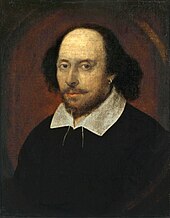Why was Shakespeare important in the Renaissance?
The Renaissance was a cultural movement in Europe from the 14th-17th century beginning in Florence and moving throughout the rest of the continent. Renaissance is French for "rebirth." The word is used to refer to the era of great achievements in the world of art. As a cultural movement, it created an uprise in the learning of classical sources, which can be seen as the link between the Middle Ages and Modern Times. It is best known for its artistic developments and artists like Leonardo da Vinci and Michelangelo coined the term "Renaissance man."
 In England, Shakespeare was at the forefront of the Renaissance movement during the Elizabethan era. As people were breaking away from the catholic Church and the focus on the absolute power of God, the Renaissance questioned man’s relationship to God. He focused on humanity and the new found freedom for artists.
In England, Shakespeare was at the forefront of the Renaissance movement during the Elizabethan era. As people were breaking away from the catholic Church and the focus on the absolute power of God, the Renaissance questioned man’s relationship to God. He focused on humanity and the new found freedom for artists.
Shakespeare was the first to bring the renaissance’s ideals to theater. He focused on creating "human" characters with psychological complexity (Hamlet, Macbeth, etc.). He rejected the two-dimensional writing style of pre-renaissance drama.
He gave human emotions to even monarchs and showed them as real people who are capable of making human errors. This really had not be explored pre-renaissance and monarchs were seen as perfect beings who could do no wrong.
Finally, Shakespeare embraced the Greek and Roman classics in his plays which had been previously suppressed by the catholic church. His comedies and tragedies resemble those of famous Greek playwrights and follow the structure of classic theater.
London was the heart of England, reflecting all the vibrant qualities of the Elizabethan Age. This atmosphere made London a leading center of culture as well as commerce. Its dramatists and poets were among the leading literary artists of the day. In this heady environment, Shakespeare lived and wrote.Shakespeare taught us how and what to perceive, and he also instructed us how and what to sense and then to experience as sensation. Seeking as he did to enlarge us, not as citizens or as Christians but as consciousnesses, Shakespeare outdid all his preceptors as an entertainer. In short, he basically reformed the “English language”! There were no greater “playwrights” than Shakespeare !


